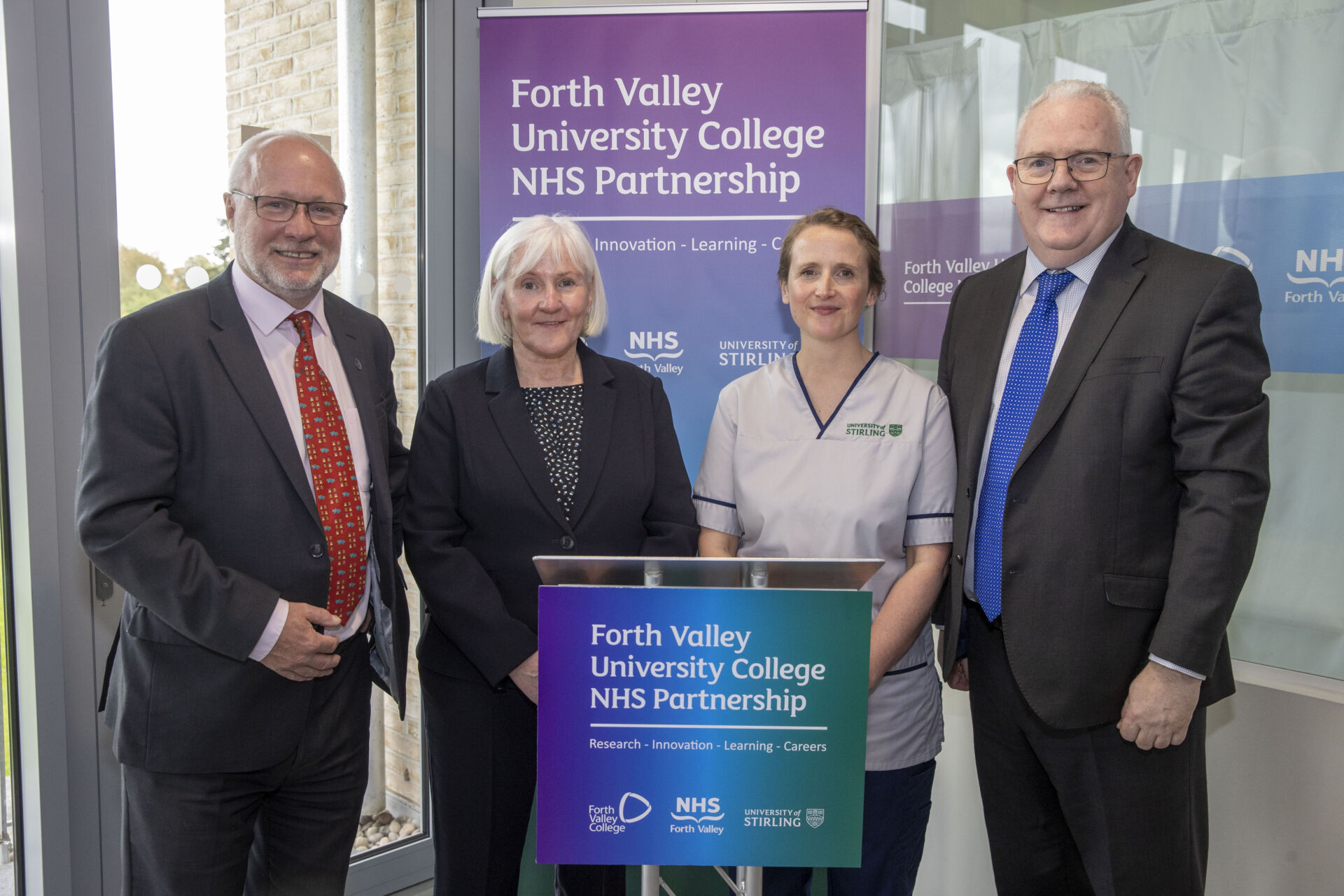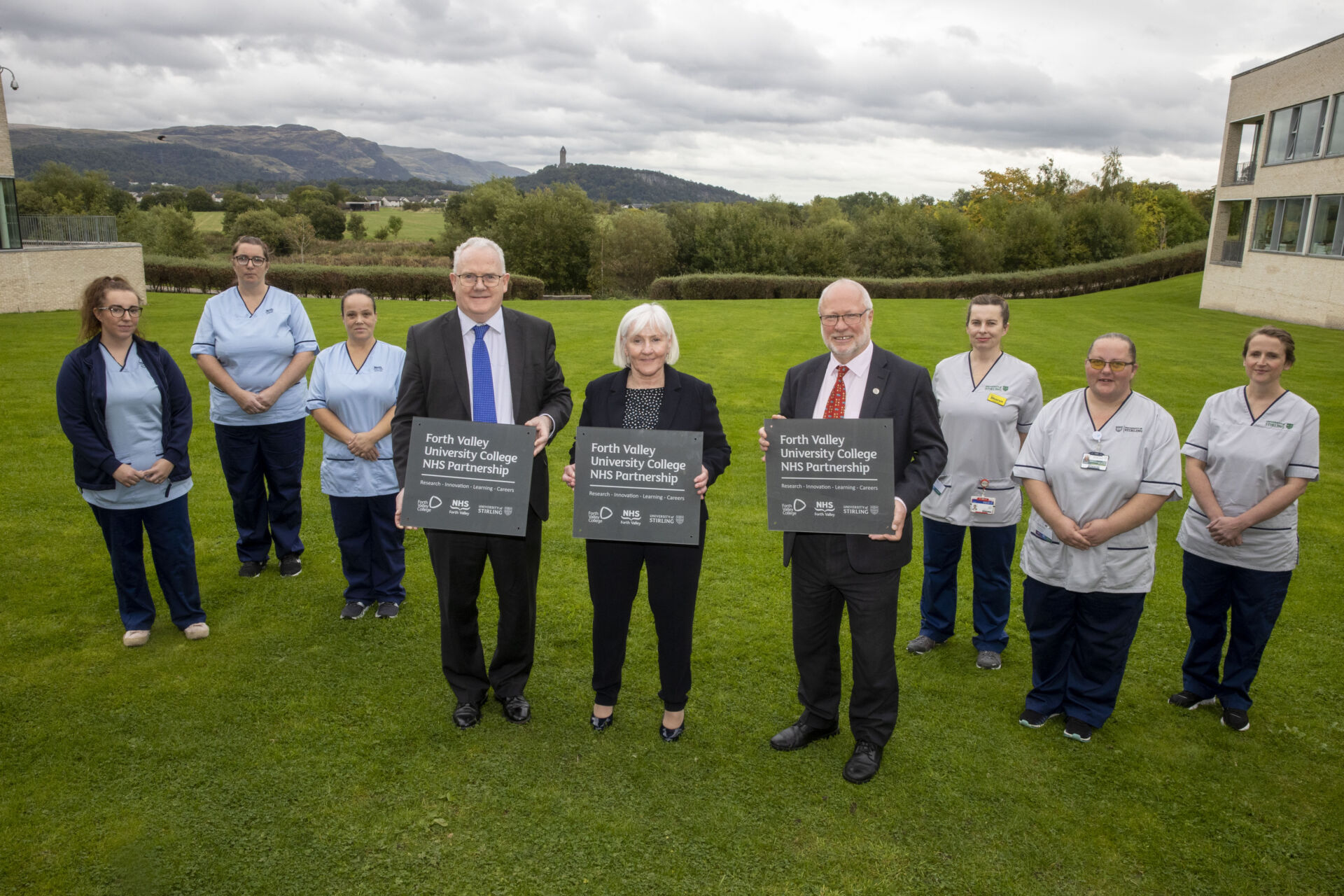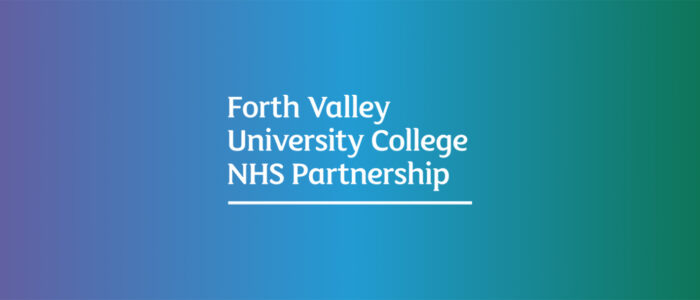Forth Valley set to benefit from landmark new partnership
An ambitious landmark partnership between the University of Stirling, Forth Valley College and NHS Forth Valley has launched today – with the mission to improve patient care and treatments, and boost health research and staff learning across the region.
The Forth Valley University College NHS Partnership is the first formal regional partnership between a health board, university, and college in Scotland. Building on a long-standing relationship between the three institutions, it will work across four priority areas: learning, careers, research, and innovation.
It aims to deliver transformational change to the health of the area through the delivery of new learning and development opportunities for students and staff working across local health and care services.
The collaboration will bring together the organisations’ unique wealth of knowledge, expertise, and experience to create a nerve centre for world-class research and innovation. It will also directly respond to the needs of local people by reaching into a wide range of settings – from hospitals, health centres and social care settings to care homes and classrooms.
Cathie Cowan, Chief Executive of NHS Forth Valley, said: “We already have a strong, long-standing relationship with the University of Stirling and Forth Valley College. This exciting new Partnership will build on this work and bring together a wealth of knowledge, expertise and experience to help unlock research funding and develop new learning opportunities for our current and future workforce.

“It will also help us trial new tests and treatments and drive forward innovations to improve the health and wellbeing of local people across Forth Valley and beyond.”
Professor Sir Gerry McCormac, Principal and Vice-Chancellor of the University of Stirling, said: “This visionary new partnership between three major organisations in the Forth Valley sees us formally unite in our ambition to deliver evidence-based innovations that will make a substantial difference to the health of people across the region.
“Our vision is for the Forth Valley University College NHS Partnership to stand as an exemplar, both nationally and internationally, of how working collaboratively can lead to substantial improvements in health and social care at a regional level.
“Not only will we look to meet the challenges facing the sector and local communities, this collaboration will also have a measurable impact on Forth Valley’s regional economy and society, creating more opportunities for students and staff to thrive and contributing to a healthier and happier society.”
Professor Ken Thomson OBE, Principal of Forth Valley College, said: “We are delighted to join with the University of Stirling and NHS Forth Valley in this exciting, innovative and progressive relationship. The opportunities that this partnership will provide to access new learning pathways leading to employment within the NHS are immense, especially within existing curriculum areas such as nursing and social care, but also in new developments such as life sciences and physiotherapy.
“Our school learners who attend College as part of our School College Partnership will also benefit from this partnership, as it will ensure that pupils are exposed to the wide variety of job roles across health and social care and will be supported by the College to start on a relevant learning journey whilst still attending school.
“Finally, I would just like to say that we are very proud of the College’s involvement in this partnership, as we are convinced it will support the regional workforce development. It will assist NHS Forth Valley to plan their future workforce requirements and make sure that Forth Valley College can help them ‘Make Healthcare Learning Work’ in Forth Valley for generations to come.”

The learning strand of the partnership will set a new bar for collaborative approaches to attracting and retaining talent in the sector. By developing new learning and education programmes to train the future heath and care workforce, the Partnership will ensure skills students gain during their studies directly correlate to the needs of the NHS on the ground.
Career development will also be a key focus, with the partnership aiming to attract and retain the brightest and best staff to drive forward improvements across all three organisations.
In the future, a new Regional Skills Academy will be created to deliver a world class programme of clinical, health improvement and social care education. A Quality Improvement and People Academy will follow, creating a hub to share best practice, develop leadership skills, and further develop career progression opportunities for staff.
In the spheres of research and innovation, the ambition is to secure increased funding to champion integrated and novel research projects which have a direct impact on patients’ lives and are immediately relevant in clinical settings.
The three partners will work together to address challenges facing local communities, and tackle inequality. Developing new tests and treatments in areas such as cancer, and mental health, will lead to substantial local health improvements.
Management of diabetes will be an early area of focus for the Partnership. Pilot projects are set to test the use of simple exercises, which can be carried out by people of all ages and fitness levels in their own home, to help individuals with type 2 diabetes better manage their condition. University academics and NHS clinicians are also already working together to investigate how hydration during exercise can help patients with type 1 diabetes control their glucose levels.
In orthopaedics research, academics and clinicians plan to look at how exercise before and after surgery can be used to improve outcomes, speed up recovery and, in some cases, prevent the need for surgery. They also hope to work with older people to explore how certain exercises can improve balance and help reduce the risk of falls – an area of great interest for the NHS.
Supporting clinical researchers and academics within a vibrant, collaborative research environment are also part of crucial plans. NHS clinical fellows will be placed in university research teams one day a week to enhance their research skills and provide additional skills and resources to support new and existing research studies. Long-term goals also include developing a Clinical Research Facility and exploring the opportunities for joint appointments to lead improvements across all three organisations.
Visit the Forth Valley NHS University College partnership website for more information: https://fvnhsuniversitycollege.org.





